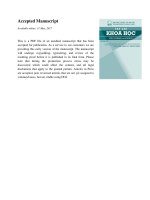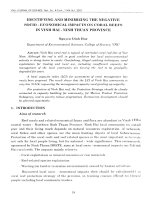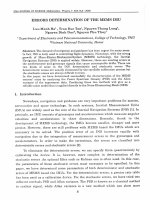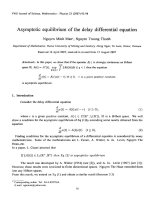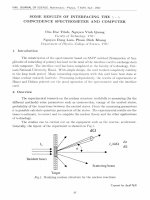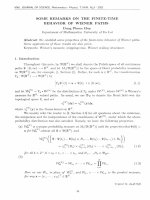DSpace at VNU: Chemical composition of the essential oil of Ocimum Basilicum cultivated in Mongolian Desert-Gobi
Bạn đang xem bản rút gọn của tài liệu. Xem và tải ngay bản đầy đủ của tài liệu tại đây (15.05 KB, 2 trang )
Chemistry of Natural Compounds, Vol. 43, No. 6, 2007
CHEMICAL COMPOSITION OF THE ESSENTIAL OIL OF
Ocimum Basilicum CULTIVATED IN MONGOLIAN DESERT-GOBI
S. Shatar,1 Sh. Altantsetseg,1 I. Sarnai,2 D. Zoljargal,2
Tran Dinh Thang,3 and Nguyen Xuan Dung4
UDC 547.913
Ocimum Basilicum L. (Sweet Basil) is cultivated commercially in many countries (e.g., India, France, Marocco, Italy)
mainly for its essential oil, which is used extensively in the pharmaceutical and cosmetics industries. The medicinal properties
of the plant are highlighted by its use as a carminative and stimulant.
The seeds are said to have demulcent and diuretic properties [1, 2] and the oil’s pleasant odor is responsible for its use
in expensive perfumes, liqueurs, and expensive seasonings [3].
They are also commonly cultivated in many other tropical countries, such as South America, Madagascar, Sri Lanka,
Cambodia, Malaysia, Indonesia, the Philippines, etc. [4].
Ocimum Basilicum L. is an introduced species to Fiji and is recognized as a useful therapeutic agent among these
peoples [1, 5]. The aromatic leaves are used fresh or dried as a flavoring agent for food and confectionery products and possess
antimicrobial activity [6].
A number of different chemotypes of Sweet Basil exist. Varieties rich in methyl cinnamate, linalool, 1.8-cineole, methyl
chavicol, and eugenol have been established [7, 8].
Seeds of Ocimum Basilicum L. from the USA were used in this study.
The air-dried parts of Ocimum Basilicum were hydrodistilled in a Clevenger-type apparatus [9] for 2 h.
About 15 mg of oil, which was dried with anhydrous sodium sulfate, was dissolved in 1 mL of CH3OH (for spectroscopy
or for chromatography). GC analysis was performed on an HP 6890 Plus gas chromatograph equipped with a FID and fitted
with an HP-5 column (L = 25 m, ID = 0.25 mm). The analytical conditions were: carrier gas H2, injector temperature (PTV)
250°C, detector temperature 260°C, temperature programmed 60° (2 min hold) to 220° (10 min hold) at 4°C/min.
The Hewlett–Packard 6890 Plus chromatograph was fitted with the fused silica capillary column HP-5. The conditions
of use were the same as described above with He as carrier gas, interface with the mass spectrometer HP 5972 MSD (70 eV).
The temperature was programmed as reported above. Component identification was carried out by comparing MS data
with those reported in the Wiley library on Chemstation HP, and in some cases with substances identified from the oil’s known
composition and also with standard substances [10].
Oxygenated constituents are the most important compounds: 1.8-cineol (8.54%), linalool (27.26%), methylchavicol
(19.77%), and (Z)-α-bergamotene (10.00%) (Table 1).
ACKNOWLEDGMENT
This work was done within the framework of the project “Antimicrobial Activity and Components of Essential Oil of
Mongolian Traditional Useful Plants” supported by the Asia Research Center in Mongolia and the Korea Foundation for
advanced studies.
1) Institute of Chemistry and Chemical Technology of the Mongolian Academy of Science, Ulaanbaatar-51, Mongolia,
e-mail: ; 2) University of Mongolian Science and Technology; 3) Faculty of Chemistry, Vinh University,
182-Le Duan. Vinh. Vietnam; 4) Faculty of Chemistry, Hanoi National University, 19 Le Thanh Tong. Hanoi, Vietnam.
Published in Khimiya Prirodnykh Soedinenii, No. 6, pp. 603-604, November-December, 2007. Original article submitted August
18, 2006.
726
0009-3130/07/4306-0726 ©2007 Springer Science+Business Media, Inc.
TABLE 1. Composition of the Essential Oil of Sweet Basil (Ocimum Basilicum) from Mongolian Desert-Gobi
Compounds
α-Pinene
Sabinene
β-Pinene
Myrcene
1,8-Cineole
(E)-β-Ocimene
Linalool
Camphor
Terpineole
Terpin-4-ol
Methylchavicol
Bornyl acetate
Mongolia
Iran
Fiji
Compounds
Mongolia
Iran
Fiji
0.22-0.28
0.28-0.33
0.56-0.57
0.43-0.47
8.54-8.64
0.33-0.36
24.49-27.26
1.05-1.10
0.90-1.18
1.66-1.72
19.77-19.85
1.22-1.54
0.09
0.44-1.79
0.71
2.85-4.20
6.58-16.46
1.97-3.44
25.14-53.70
0.08-0.34
0.17-0.45
0.22-0.27
6.25-6.64
0.78-1.31
Tr.
Tr.
Tr.
Tr.
4.6
Tr.
22.3
Tr.
Tr.
Tr.
Eugenol
Methyl eugenol
Methyl cinnamate
β-Elemene
(Z)-α-Bergamotene
α-Humulone
Germacrene D
Bicyclogermacrene
Nerolidol
t-Cadinol
β-Eudesmol
1.56-2.71
10.00-11.22
0.85-0.99
3.51-3.80
0.45-0.55
3.21-3.72
5.72-7.44
-
3.14-5.92
1.38-5.62
0.08-1.40
4.60-6.97
0.27-0.41
0.13
0.46-0.47
3.63-5.65
Tr.
3.20
24.7
23.60
-
REFERENCES
1.
2.
3.
4.
5.
6.
7.
8.
9.
10.
J. J. Brophy, Flavour Fragr. J., 1, 53 (1986).
K. M. Nadkarni, Indian Materia Medica, 3rd edn, Popular Book Depot Bombay, India, 1954.
S .R. Robbins, Rep. Trop. Prod. Inst. London, 121, 171, (1979).
Selected Medicinal Plants in Hanoi, Vietnam , 2, 146 (1998).
E. Guenther, The Essential Oils, Vol. 3, Krieger, New York (1949).
R. A . Omidbaigi and A. Hassanil, J. Essential Oil Bearing Plants, 6, No. 1, 104 (2003).
B. M. Lawrence and D. M. Peele, in: Proceedings of the 8th International Congress of Essential Oils. Cannes,
France, 1980, p. 111.
B. Skrubis and P. Markakis, Econ. Bot., 30, 389 (1984).
R. P. Adams, Cedar Wood Oil-Analysis and Properties in: Modern Methods of Plant Analysis-Oils and Waxes,
H. F. Linskens and J. F. Jackson (eds), Springer-Verlag, Berlin, 1991.
R. P. Adams, Identification of Essential Oil Components by Gas Chromatography/Mass Spectroscopy, Allured
Publishing Co. Carol Stream, Illinois (1995).
727


